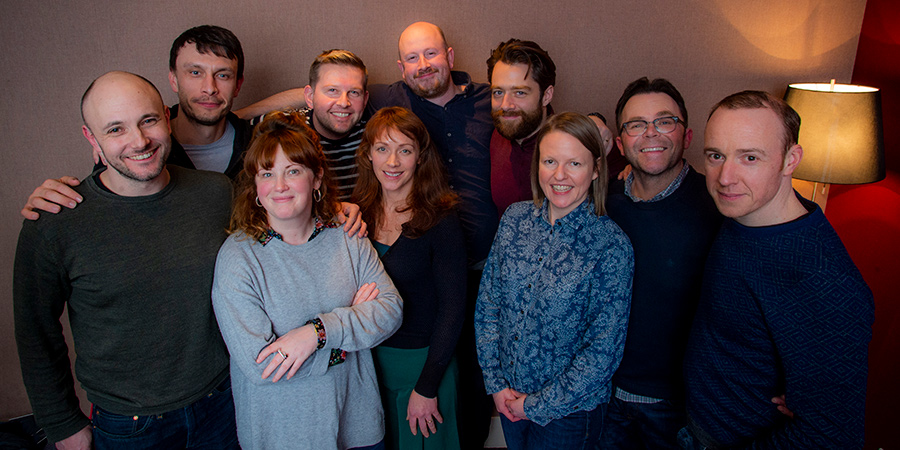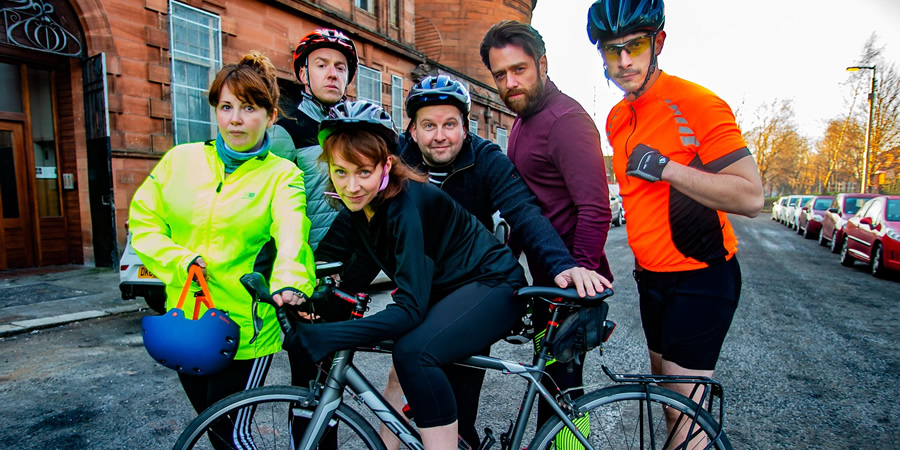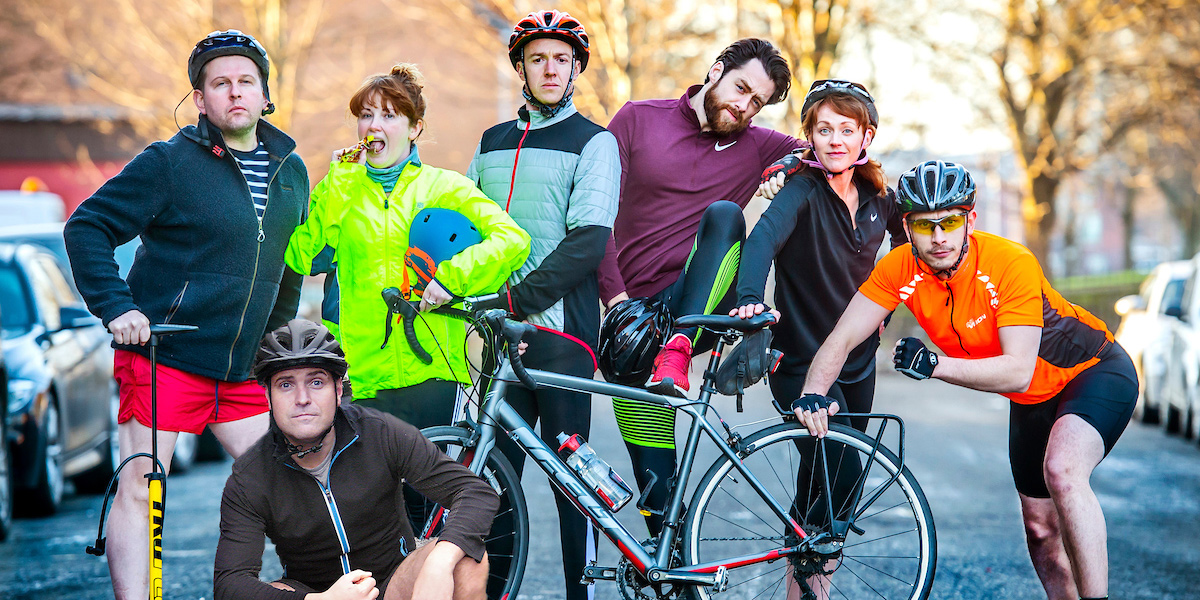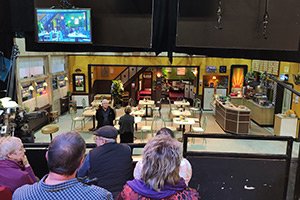Steven Dick & Chris Grady on comedy writing interview

Comedy writers Steven Dick and Chris Grady co-created Saddled, BBC Radio Scotland's sitcom series focused around members of a cycling group. With the format about to return for a second series, we thought it a good time to ask Chris (on the far left of the picture above) and Steven (middle of the picture, with the shaved head) about their careers, the show, and more.
How did you first get involved in the world of comedy, and how did you meet each other?
Chris: Back in 2005 I sent a few sketches to Niall Clark (our script editor on Saddled) at The Comedy Unit and he was kind enough to get back to me with some positive feedback. He also suggested I submit material to a monthly live comedy night the company ran to develop sketches for TV.
Seeing my material fly (sometimes) or die (moretimes) each month in front of an audience was an invaluable, if nerve-wracking, experience; it helped me get commissions on radio and TV pretty quickly. I thought the whole comedy thing was going to be a doddle after that, but then there was a five year gap between those first commissions and my next one, so I was as stupid then as I am now. Luckily, The Comedy Unit were really supportive of new writers and gave me a job as a script editor, so I could help other writers to achieve my dreams.
I'm looking forward to reading Steven's answer to how we met because I can't remember the first time. I know I was aware of him beforehand though; pretty much every comedian I knew mentioned his impeccable joke writing skills. We talked about doing something together for a while, which was probably just something to say when our mutual friends had gone to the bar. Our first co-written project was an Indyref/Brexit inspired radio pilot about a Scottish village that votes to become part of France. DISGUSTINGLY, it didn't get picked up. But we had a great time writing it and quickly started something new, which was Saddled.
Steven: I've always been comedy obsessive, collecting stand-up albums, going to hundreds of Edinburgh Fringe shows and then going 2/3 times a week to the newly opened Stand Comedy Club in Edinburgh. I did one of their workshops and started performing, which I then did for next 20 years on and off.
I met Chris in the Glasgow club probably. By then he was writing and so was I. And I think we gravitated towards each other as writing is where we saw ourselves.

Do you cycle?
Steven: I can ride a bike. (Said in the voice of a 5 year-old). However I don't have one and don't intend to unless Covid goes on for another year and I have to sell my car.
Chris: Not only do I cycle, but my bike is the one in the promo shots for Saddled. Driving terrifies me so I've commuted by bike most of my life. I only really got into road cycling a few years ago and became a bit obsessed quite quickly. Lycra is a part of my life but I can give it up any time I want to. It's not a problem. Everything's fine.
What can we expect from Series 2 of Saddled?
Chris: A lot of jokes, an appearance on Eggheads, and a deeper dive into Mark and Dawn's relationship. The spectre of Jack loomed large in Series 1, but Series 2 is more about how their marriage affects the rest of the Easy Riders, and vice versa. So it's a bit more of an ensemble-piece this time, even though Mark and Dawn are still very much at the heart of things. There's also one episode about motorists versus cyclists that we're hoping will stop the war between them, but might make things worse.
Steven: Some very funny performances from the cast. A new permanent location of Brennan's bike shop slash cafe where we'll spend much more time. Although why is a mystery, as his customer service skills are aggressive. As for stories, we've got the gang competing for their place on Eggheads. A urinary malfunction in an escape room, and a stakeout to catch a bike thief. All alongside the crumbling marriage of our two central characters.
You had a cast change to deal with this series. At what point did you find out Richard Rankin wouldn't be doing Series 2, and how - if at all - did it impact on your planning/writing?
Steven: We'd written him into the second series, but these Hollywood types are notoriously fond of Hollywood, so he couldn't make the record. So, rather than recast, his character is mentioned briefly, but he's replaced by Robbie, who's even nicer!
Chris: It was pretty late on! I think it was a week, maybe two before recording? It was just one of those things, a mix up with dates, but we had a few options available to us. One was to recast, but Rik was so good as Jack that we didn't like that idea much. We considered writing the part out but we kept coming back to how much we liked the dynamic we had, and what Jack's energy brought to that. So we rewrote the episodes and brought in a new character, Robbie, who was like Jack in a lot of ways but still his own man - something he's keen to point out an every opportunity. It was gutting to lose Rik but Gerry McLaughlin came in and did a wonderful job.
Steven: As we move toward TV, Richard is keen to be involved so he may well be back.

More generally, how do you write?
Chris: We storyline together, two episodes at a time, then do a fairly detailed scene by scene. After that we split the episodes in half, so I would write the beginning of Episode 1 and the end of Episode 2 while Steven is writing the end of Episode 1 and the beginning of Episode 2. Then we swap and fill in what's left to be done. The person taking over the half-finished script will always rewrite what's there to make sure the script feels like it was written by one person. Once we've got a rough first draft of two episodes, we get together and rewrite them, ironing out any outstanding issues/massive disagreements, as well as adding as many jokes as we can.
Creative differences haven't been a big problem so far. In terms of jokes, we're both trying to make each other laugh, so if we don't manage it that's a pretty good indicator the joke doesn't work, regardless of how fond he or I might be of it.
And that's more or less how we do it for story and character too. If an idea becomes a sticking point then we tend not to dwell on it and just try to come up with something else together. We don't really move on until we're both happy; there's no point in having our own show and writing something 50% of us aren't completely on board with.
That said, Steven might say I just bang on about what I think until he gives in, which is probably fair enough.
Steven: We talk a lot together to get stories we think have potential. Then build up how to tell those stories, making sure we're giving all our actors something to do. And then when we have an outline we'll do half an ep each, then swap. But very quickly we're back together for lots of rewrites. So we're together more than apart.
It's been remarkably smooth regarding creative differences. More often than not we put stuff in the script and if it's crap then it will naturally fall out, if it's no good. And the person who put it in will usually be the one who removes it. And by that point we don't know who's is who's anyway. It's just the script.
But those little creative differences are the fun bit, where you can spend an afternoon discussing what the funniest colour, or word, or description for a thing should be.
How important is it to have a producer you are on the same wavelength as?
Chris: It's hugely important, because battling with a producer while you're writing would be horribly distracting and not the best motivation (unless you thrive on pure hatred). Thankfully Gus (Gus Beattie of Gusman Productions) has been enthusiastic and supportive from the very first time we pitched him the idea. His drive and energy was an enormous part of getting the show commissioned, and getting Series 2 recorded in the middle of lockdown was Gus at his proactive best.
Steven: Gus gets what we're trying to do, and is great at bringing the right people together, with the very best facilities, sound engineers etc so everyone feels happy and motivated to get on with the job.
Characters are key to sitcom aren't they? Do you have any tips for new writers for how to create characters and ensure the dynamic between them works?
Chris: Once you know your characters it becomes so much easier to write the thing. We like writing funny plots and taking the audience on a surprising journey, but without good characters you're just feeling your way in the dark, trying to second-guess what the right answer is. Once you know your characters, you know what they would and wouldn't do, and in sitcoms that's the thing to have fun with.
Archetypes are a good starting point. For Saddled, because it's a sports/activity setting, I remember suggesting a lot of real people I'd met at various team sports over the years. There's always an organiser (Francis); someone with all the kit who takes it too seriously (Brennan); the ultra-competitive one (Dawn); an affable athlete (Jack); and someone who's there to get out the house (Sue). Mark was a good wild card because he had no interest in the sport but absolutely had to be there. The others all want to be there but for different reasons, so there's conflict even though they have something in common.
From there, add details to make them more rounded, more of a person. Knowing what your characters want and what drives them is obviously important but knowing what they enjoy, what little things piss them off, humanises them that little bit more. And really think about what it is about this particular character people will find funny.
As for tips on dynamic, I'm not sure you ever really know if it works until you're writing. But doing that's important in itself because then you can see what the problem is.
One practical thing is imagining who you'd like to play the part and then doing their voice as you say the lines out loud to yourself.
Steven: When I'm thinking of characters I like to begin with: 'who would be the worst person to be in this situation?'.
Look at Fawlty Towers - each character is uniquely terrible for the situation/role they have in the hotel.
And once you've got one character think what kind of character would be particularly triggering for them. What kind of person would upset them, anger them, frustrate them at every turn.
As freelancers, this year can't have been good for your nerves? Do you have any jobs lined up for 2021 yet?
Steven: We were due to record this series then lockdown hit. We attempted a zoom record but it was too frustrating, but - during the short easing - Gus managed to get us all in a socially distanced recording studio which seems miraculous now.
I've had jobs cancelled, and for 5/6 months there was nothing. But things are picking up again.
So I was amazingly fortunate to get the gig writing Jack Dee's script for the remotely recorded socially distanced episodes of I'm Sorry I Haven't A Clue which are being broadcast this December.
And I'm a long time collaborator with Frankie Boyle, so he's got a New World Order review of the year in December that I'm writing for.
But the short answer: work in 2021 - who knows!
Chris: Hopefully we'll be doing more Saddled. I had a few other projects 'postponed' in 2020, so I'm looking forward to them being 'cancelled' in 2021. Thankfully, one of my other jobs is writing for River City, Scotland's premier/only soap, and somehow we've managed to keep making the show despite the restrictions.
This article is provided for free as part of BCG Pro.
Subscribe now for exclusive features, insight, learning materials, opportunities and other services for comedy creators.


